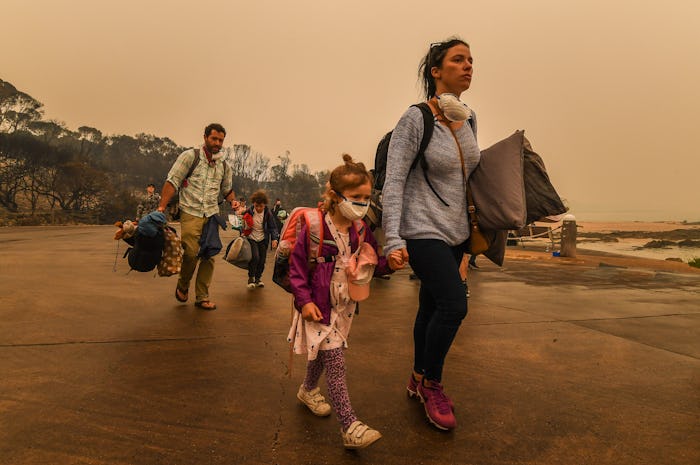Life

How To Talk To Your Kids About The Devastating Bushfires In Australia
When disasters such as the destructive fires currently sweeping across Australia occur, parents are tasked with discussing the devastation with their children. Knowing how to talk to your kids about Australia may not come naturally, but keeping an open line of communication is key.
"Parents need to put the Australian bushfires (wildfires) in context for their children. There are natural disasters that happen, which is what these Australian fires are," Maureen Healy, child psychologist, author of The Emotionally Healthy Child, and parenting coach at Growinghappykids.com tells Romper.
The current bushfires are some of the worst in Australia's history, according to a report by the Australian Broadcasting Company. At the time of this writing, 24 people have died as a result of the fires, and an estimated 480 million animals have died, reported CNN. The situation is dire to say the least, and splashed all over televisions and the internet, so the topic is bound to come up with your kids.
Even parents with the best intentions of shielding their children from seeing the harrowing news coverage coming out of Australia may still have to broach the topic with their kids. Parents of school-aged children especially might have to correct misinformation that their child might pick up at school or overhear on television.
"Too much media is never helpful," Healy tells Romper. "It depends on the child you have, but simply telling them the facts — as needed and appropriate — is the best approach. You don't want to plant too many scary images for your children, as anxiety and stress disorders are already on the rise in the United States in elementary, middle, and high school students."
If your child is old enough to consume media coverage about the events in Australia, it may be helpful to provide videos yourself for them to watch that are more easily digestible than the nightly news reports. The Australian Broadcasting Company recently published a video on their website that explains the bushfires through the eyes of the children in Australia, which may help put the situation into a more easily understood context for kids.
Avoiding addressing heavy topics with your children might be your gut instinct (admittedly, it used to be mine), but the reality is that kids need to be reassured by the adults in their life when disaster strikes. Even though you may be thousands of miles away from Australia, your kids' awareness of pressing global issues can broaden their worldview and help them become more aware, compassionate adults one day. Of course, you'll want to be mindful of how you deliver this information, so understanding how your child may process it is important.
"Children are all different. Being able to share the appropriate information with your child is essential to optimum (not perfect) parenting. Some children who worry may not need more information to worry about, but they'll need the simple facts in an age-appropriate way," Healy tells Romper.
In a Unicef Australia article about how to help kids cope with disaster, the organization recommended parents use activities such as drawing or other enjoyable tasks to help kids work through their feelings when talking about the fires. They also recommended offering reassurance to children who may be distressed to hear about what is happening.
In addition to talking to your kids about what is happening, there are also a myriad of ways to help the people and animals of Australia affected by the fires. Allowing your kids to get involved can help them feel empowered. Healy recommends that some children who enjoy helping others might want to "learn how they can donate to organizations helping other parents and children impacted by this." She also notes that parents and children "can learn together about climate change, donate to organizations helping the victims, and if spiritual, include them in their nightly prayers."
Experts:
Maureen Healy, child psychologist, author of The Emotionally Healthy Child, and parenting coach at Growinghappykids.com